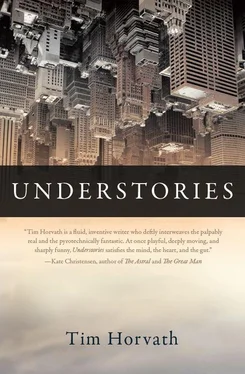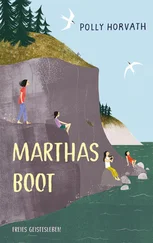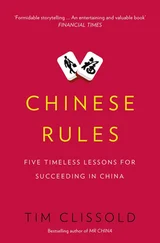Urban Planning: Case Study Number Three
There is no room at the Manswer-Antoli, the city’s eponymous hotel, but he’s so accustomed to being turned away that signs barely register. His boots, trudging about the city, are somewhere on the far side of mud-caked, a thick-crusted record of travels through floodplain and savanna, taiga and miasma. He would do well to stop and borrow a chisel and scrape them, lose some of that deadweight. But every time he’s about to do that, he thinks, Wait, maybe he could plant something in them — what, after all, is more precious than land? He could grow vegetables — nomadic tomatoes, wandering watercress. He cannot tell whether this is a good notion or simply hunger’s delusional logic, so he bends down and tucks a two-leafed twig into one of his mudbanked feet — for memory, so he can reconsider when his mind is clearer, once he’s rested.
The shops are closed for the night, grates tightly drawn, those lacking grates sending out red alarm pulses at staggered intervals. In their inaccessibility, objects take on heightened desirability — a baguette that looks like it might regenerate endlessly, a chest of drawers that promises to keep him company, talk or listen if he decides to unravel his own story.
For a city so utterly shut down, it is strangely alive, bustling with pedestrians. After some of the places he’s been prior, he is most grateful for this heavy foot traffic, this to-and-fro. Whenever he thinks about dying, he reminds himself that when he has pictured his own death in the past, it has always been him alone. Because nonexistence runs so counter to the spirit of such company, he feels protected by the crowds. So long as he can distract the part of himself that will decide to die, he reasons, it cannot happen.
And once he settles down, finds lodgings, gets a few bites in him, showers away the grunge, he’ll revel in it like an anthropologist, a theatergoer, a bird-watcher, a flaneur in situ. In his current state, he knows, his mere watching will seem threatening, arouse suspicion that he is sizing them up for robbery and worse. Best to maintain distance, feign disinterest. Little stolen glances and peeks must suffice for now. The scarf of gauzy translucent red, trailing a woman who rolls forward with the certainty of a shore-bound wave. Two businessmen, mirror images but for one’s mole, the other’s suspenders. Boys with flatulent elbows and sharp whistles and spasmodic laughter.
Who knew Manswer-Antoli was so popular, so teeming with life? All this he would’ve missed if he’d heeded the warnings against coming here.

Hours? Days? He can’t keep track of how long he soldiers on, the signs all identical: NO VACANCY, CLOSED. If I could just rest on a bench, he thinks, sighing at the streamer of tape that seems to partition off each and every one, warning of wet paint. It would be worth anything simply to sit. A pair of pants — small sacrifice, that, for savory comfort, renewal.
Crouching to slip under the tape, he hears the policeman’s piercing whistle.
“What’sa matter, can’t read, buddy?” says the officer.
“I can,” he grumbles, moving on. What civic diligence they abide by here! It’s too much. As he shuffles off, he hears the officer’s radio blasting staticky bulletins and glances back to see him shaking his head in obvious pity and disdain.

Soon enough, soon enough , thinks the officer, watching as the man with the tiny tree growing out of his shoe hobbles away. It’s not his job to inform him, obvious newcomer, that he is dead, that ghosts can never sit, never alter, but only walk the streets and boulevards ceaselessly, exactly as they arrive. No, let him wait , the officer thinks. Let him wait while he still can for the shop doors to spring open like shutters on country villas, wait, as we all did once, for the aroma of fresh-baked bread to burst forth and fill the air .
The Discipline of Shadows
Up on the chair, I reach for the ceiling and beat the vents, sending mold fluttering downward. Like some black rain, it lands variously on me, on chipped, yellowing tiles, on the paperwork fanned out over my desk. It speckles the latest budget, leaves a trail of powder on the glossy cover of the newest International Journal of Umbrology . It must be going into my lungs. I think about miners descending, invisible until the shaft collapses and the cameras swarm. Maybe, I think, this is what we need — some tragedy. Something more than mere scandal. More than Lew and his lawyer. More than the death of a department, which is like an animal, already limping, vanishing at last under the wheels.
I won’t have time to change my shirt before the big meeting, and for a moment I regret this. After all, lawyers and trustees, the titled and brass-nameplated, will be there. Lew’s “representation,” all the way from Lower Manhattan. At yesterday’s department meeting, the guy sat with Lew, hovering at the edge of my vision, a thick-browed smudge of pleated charcoal. Finally, I wanted to confront him. “Mr. Vadrais,” I wanted to say, “at the end of a workday, when you exit Two Fourteen Pearl, do you ever pause to take in the shadows?” I felt them like a chill, then, those revenants of an older New York, strewn across the narrow, birdshit-encrusted streets.
But I held my tongue. He would’ve been mystified, and the rest of them would’ve all thought I was losing it.

The Department of Umbrology is located in the basement of Sackler Hall on the easternmost edge of campus. Our neighbors are the physical plant and Parking Violations. Students and professors of all ages huff by in three-piece suits and skimpy spaghetti-strappery, tickets in hand, excuses rehearsing themselves upon the tongue. Upstairs is the old Engineering Library (the new one, slated for ribbon cutting in September, a veritable suspension bridge with walls — it stuns) and three rooms the Theater Department uses as a sort of gulag for old props. There’s talk of tearing the building down. The odds of our outliving it? In this economy? I ask you. A memo before the wrecking ball meets the wall is what I hope for.
At four full-timers and one visiting professor, we are the smallest department on the campus (not including the interdisciplinary ones, like Africana Studies and Foreign Languages). I’m sometimes asked to defend my department’s integrity (and I mean this etymologically — no one, till now, has questioned our moral stature, only whether we ought to be considered one). Well, I muse, what about Foreign Languages? Are they “one”? Can we roll up all the vernacular, all the literary traditions, the Day of the Dead and Bastille Day and the notebooks of Dostoyevsky and das Bier und Bratwurst , and, by cramming them together under a single roof, make them one ?

Immediately down the hall from my office is that of Dahlia Peterson on one side and Phil Abelard on the other, and then past that is the office of Lew Dorris, and then finally our visiting scholar, Alex Kuperman. Dahlia is our shadow-theater person; she thinks she’s made it to Broadway and I’m not going to disillusion her. Her office, the largest, illuminated from within by Indonesian lamplight, ushers one into a 2-D universe of gauze stretched between bamboo poles, tables overspilling with the most ornate, intricately carved puppets. The room is always alive, CD player blaring gamelan or some mainstream fluff, students snipping and doweling away at all hours like child laborers, only happy, her Brooklyn accent wafting like fresh bagels down the hallway as she chastises them: “Not like that. . Who taught you how to. . Here, here.” She’s superficially abrasive but profoundly gentle, the students inform me — worked to the bone, by term’s end they are putting on virtuoso epics of Bali, Turkey, or China, and in Advanced they Westernize, shadow-working their family memoir, slave ships with oars the luminous water pushes back at, streets that seem somehow paved in gold even if just variants of black, always, Marge Simpson makes an appearance, it’s a running joke. Abelard is the one who’s been here longer than I and grown way too complacent. Doesn’t bother with office hours, hasn’t produced an iota of scholarship in twelve years. Wrote his book about shadows in lit back in the day, but since he got tenure, it’s been a handful of conference talks and Easy Rider in his swivel chair. Kuperman’s fresh blood but wrong blood type — hasn’t panned out at all. My hopes were high. A scholar of neonoir, he’s actually produced a film you might’ve seen, The Better Half ? So we’ve snagged ourselves a bona fide celeb. Too bad he’s always on the phone with his agent — pair of Bluetooth pincers, one on each ear. He teaches on Tuesdays, and then I swear he slips out between the blinds, jetting back to L.A.; his weekends start Wednesdays. I won’t miss him, nor will the students. He was a mistake — a case of mistaken identity, you might say, with no more interest in shadows than a rooster has in gold coins. But one door farther down is Dorris, our rock star. Astrophysicist, Ph.D. 1987 from Dartmouth, his long, frothy hair cascading onto ample shoulders, but don’t be distracted — you’ll need all of your cognitive faculties as he leaps from discussing what happens to shadows from objects approaching the speed of light to the tiny fingerprints left behind by the particles called muons. Then he unwinds by pummeling his way through some video game, sounds like a teenager in there, tearing things up, kicking through walls and mowing down Nazis. Like some home brewer, he even designs his own games as pastime. But no ego on him, no Kuperman. He pro duces , too — four reputable journal pubs in the past year, four! Unheard of. One in the Umbro , too, the mothership, damn him.
Читать дальше













